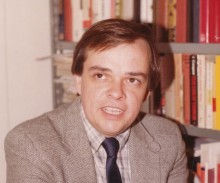James Mace was born on February 18. To commemorate the American expert on Ukrainian history the Memorial Library of James Mace has been opened at the National University of Kyiv Mohyla Academy (NaUKMA). He left his private library to Ukrainians, in order to be able to communicate with them with the help of books. Now the space for reading of one of the first researchers of genocide in Ukraine of 1932-33 has been placed in the premises of the American Library of the university.
Mace raved about Ukraine from the overseas – he gave us the chance to read our own forbidden history and left us interested about our own past. Mace had partisans; owing to him this “post-genocide,” according to his term, Ukrainian society may be saved from amnesia. For many years the researcher cooperated with The Day as a contributor and as an editor. His articles, columns, and speeches have been published not only in the issues of the newspaper, but also the books: Day and Eternity of James Mace, collection of Mace’s articles Your Dead Chose Me, the series “Subversive literature,” and Ukraine Incognita. TOP 25.
At the moment the Kyiv Mohyla Academy is storing 67 private collections. James Mace’s library is a special space for reading, thinking, and communicating. The transparent glass doors leading to the library hall are intriguing. Taisia Sydorchuk, the head of the department of rare books and manuscripts invites, “Mace was a very open and sincere man. His collection deserves to be open too.”
The library received the first part of the books and periodicals from Mace’s collection back in 2004 from Mace’s wife Natalia Dziubenko-Mace. The books the researcher collected in the US were sent to Kyiv later. Mace started to compile the library back in the 1970s. The oldest book in the collection was published in 1814. The compilers of the guide of Mace’s private library counted nearly 3,000 books, mostly in English, Ukrainian, and Russian. There are also books in French and other languages. The dedicatory inscriptions, autographs, and Mace’s notes in the margins are one more library in a library, which, Ukrainian researchers assure, will for sure find its “archeologist.”
“Today we haven’t bought any flowers, because in his library there is an eternal flowerpot with ears,” says the head of the scientific library of the NaUKMA Tetiana Yaroshenko. She also reminds of the old-time idea to establish a monument to Mace at the entrance to the first building of the Kyiv Mohyla Academy: “Maybe we should remind the new government of this. But today we have his memorial library, there is a place to visit Mace.” Yaroshenko emphasizes that it is time to carry out one more important project, translate into Ukrainian Mace’s doctoral paper “Communism and the Dilemmas of National Liberation: National Communism in Soviet Ukraine, 1918-33.”
Bohdan Nahailo, a scholar, writer, and former head of the Ukrainian office of the Radio Liberty emphasizes, “This library is a monument already. He would have been very happy.” It is often mentioned that Mace started to take interest in Ukrainian history of the 1920s owing to a professor of the Harvard University Roman Shporliuk. Nahailo adds a few more surnames: Roman Solchanyk, Liubomyr Haida, and Frank Sysyn. There is no need to go far for evidence – the unique books authored by them and carefully read by Mace are now standing on the main shelf in the memorial library.
“A communicable, generous, warm, and modest man with a good sense of humor had time for everyone,” Nahailo says about Mace. Since youth, when they communicated with Mace the most, Nahailo has remembered Mace as a very “natural and informal man.” According to him, the atmosphere of discussions with James had always been relaxed, but focused. He could be immersed in his thoughts and speak about things he took interest in: “He could come out of the bathroom and, with a toothbrush in his mouth, speak about Skrypnyk, for example.” And when they communicated in Ukraine already, Mace didn’t conceal, “He said it was hard with Ukrainians. The support and understanding were limited.” What would he say about Ukraine of 2015? The hints are in the atmosphere of the books he wrote and which he loved.







